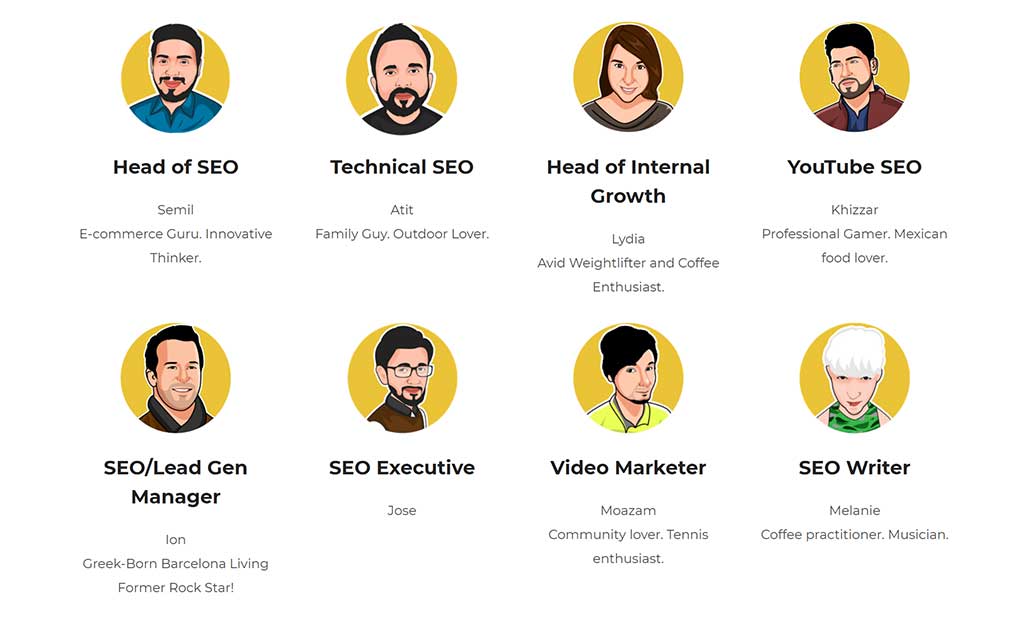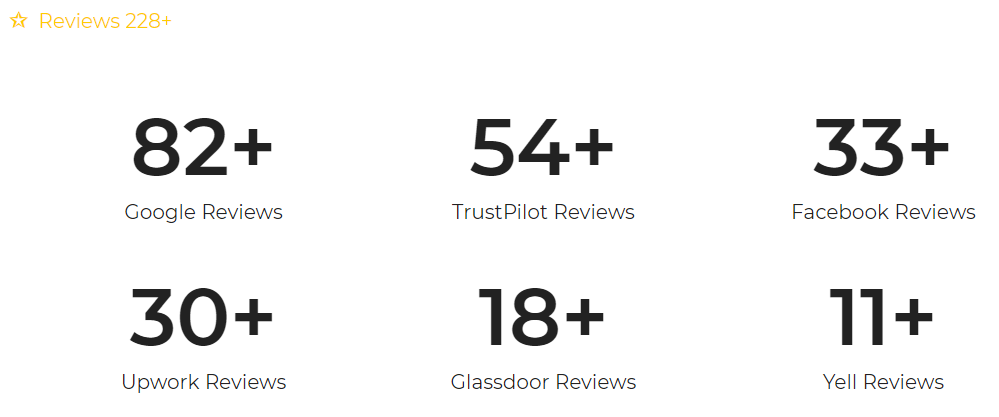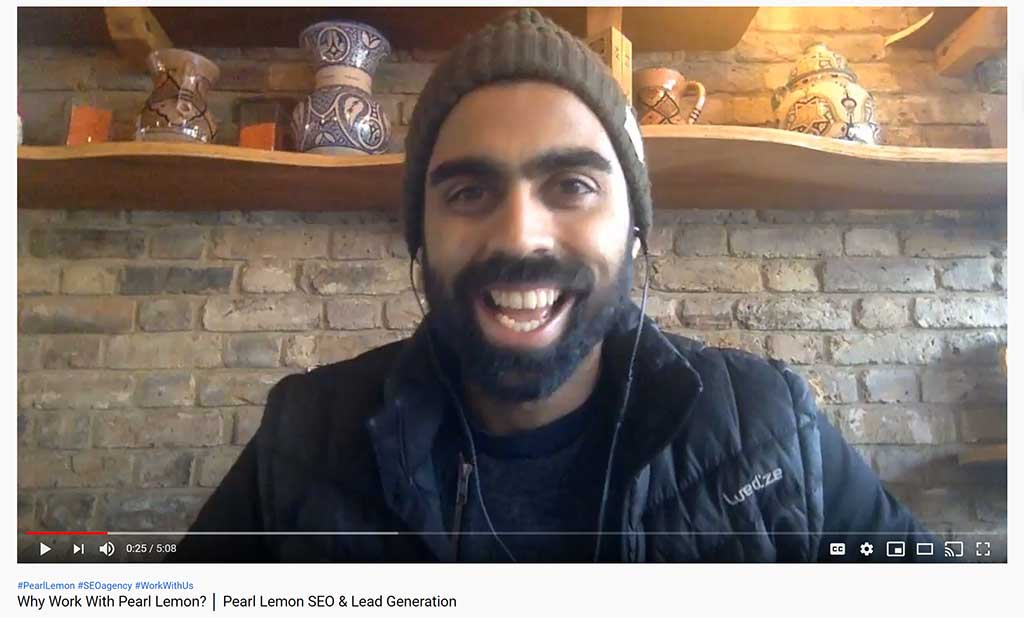
Since we started the Digital Agency Founder Interview series last month, we've loved reading your great comments and feedback. Clearly, these interviews are valued by the community so we'll continue to do them! Our emphasis will remain on how these successful founders started their agencies, what processes they used to grow and what techniques they use today for lead gen and retention.
Interview with Pearl Lemon
In this episode of our Digital Agency Founder Interview series, I chat with the one and only Deepak Shukla, Founder and MD of London SEO Agency Pearl Lemon. He started the agency in 2016 from his mum's house and scaled it to a nearly £300K business in under 2 years.
Listen to the full interview (33mins) below or jump to the interview transcript:
In the short time I've gotten to know Deepak, I've been really impressed by his approach, not only in building his agency but his outlook on life. Deepak is a true hacker. He has a natural ability to figure out how systems work, leverage them and build success incrementally. He's an expert at iterating and creating processes, having built a completely distributed agency of over 25 people. Distributed agencies are rare, mostly because their so hard to get right but Deepak has forged a winning strategy based on his unique methodology.
Today Pearl Lemon's distributed team operate from the United Kingdom, Jamaica, Israel, The United States, Pakistan and India! This means they can service clients in nearly all timezones as the team is spread across a 12+ hour timezone span.

To make this work, they literally have every agency process documented from lead generation, client onboarding and every aspect of delivering client work. Doing this means, the team can scale quickly because new-starters can get up to speed in their own time by watching the agency's internal YouTube channel which contains their processes in video form.
Deepak's experience in the SEO world started on the freelancing platform Upwork (in fact he still uses it to this day). He cut his teeth on SEO jobs of all shapes and sizes to build his reputation. Even at this early stage he was already experimenting with ways to attract new clients - dabbling with scrapers, messaging 20 people a day and writing status updates on LinkedIn (several of which went viral).
I got a great education ultimately by not having any pride to take on crap jobs.

It's clear the early days were a grind. Lots of cold email outreach, follow-ups, LinkedIn status updates and jumping on service marketplaces to bid for small SEO jobs. But this tenacity gave the fledgeling agency some runs on the board. It gave them the ability to build up their portfolio and cut their teeth on projects at the lower end which typically saw them over-delivering for demanding clients with limited budgets.
Deepak says he's a big believer in Grant Cardone's ethos:
You should love your sh*ttiest clients, they will teach you everything you need to know because if you can please that guy who wants blood but only has a $500 budget, you're going to be like a f*cking dream when you get the guy who's got $5,000 dollars.
In the digital marketing industry, you constantly hear the term "test and learn". While this is what most marketers strive to do, few actually achieve it. Mastering this is just one of the things that makes Deepak and his agency so successful - a true testament to the power of the test and learn approach.
The difficult part is the quieting of the conscious mind. We should all be empiricists a lot more and we should extract data from the world through actual experiments we run ourselves.
Taking this idea to the next level, Deepak thinks iterating yourself and experimenting is a much better approach than trying to learn from other people's mistakes:
There's this whole thing that you should learn from other people's mistakes - I think that's so bogus. Because what if I meet 5 people who failed at Facebook Ads? Does that mean that I should stop using Facebook Ads? There's so many individual variations for why people fail that I don't think it bears as much fruit to learn from someone elses failure.
These days, Pearl Lemon focus on inbound which makes up 80% of their new business. They generate a very healthy 160 new business leads per month which is trending up. Pearl Lemon have embedded SEOptimer's Embeddable Audit Tool on their website which delivers them new leads every day.
Another thing Pearl Lemon has done amazingly well is built up a strong online reputation. They have over 220 client testimonials and reviews:

Deepak has built processes for obtaining public reviews into each part of their workflow.
Anyone that gets positive feedback should make sure its on a public forum.
They don't wait until the end of a commercial engagement to ask for the review, typically they request the client to write a public review after the first tranche of work. They even ask potential clients to leave reviews if they've had a great experience talking to the sales team but can't afford to actually go ahead with the agency's services - every agency should adopt this approach.
My sales guy generates more reviews than he does sales per week. For every 1 deal that he closes, he generates 4 reviews.
Pearl Lemon have a great onboarding process for new clients too. Like several other SEO agencies, Pearl Lemon offer a 90-day guarantee on their services:

While they still run full SEO audits, they frontload the project with actions upfront to work as fast as possible to get results.
We do things aggressively and fix as many technical problems as we can in the first 2 weeks. We ask for CMS access day 1, GSC access and GA access day 1.
They also create an "outreach@" email account on the client's domain so the client can monitor Pearl Lemon's outreach campaigns and see the work as they do it.
Another thing about Pearl Lemon that sets them apart as an agency is the way they've been forced to document and build processes around absolutely everything they do since they're a distributed team. Often the weakest link in any workflow is the human. So by systematically automating and turning most workflows into processes, the agency is able to operationalize an incredibly efficient machine which can actually scale and can execute consistently at a very high standard.
Processes become infinitely stronger when you're remote.
Not only are these processes internal but many of them are client-facing too. Pearl Lemon connects with each of their clients over WhatsApp - something most agencies would be very hesitant to do. But by creating this direct connection to the client, they become the go-to resource for any SEO questions. When a client question or problem comes in over WhatsApp, the team check if its been asked before - if so they fire off a link to a process doc which explains the answer. If its a new question, they write the process doc and send it to the client (and all future clients who ask that same question). It cuts down on meetings & WIPs and builds a strong rapport therefore reducing client churn in the long run.
For the majority of digital agencies that are co-located (or indeed working remotely due to the pandemic), now is the time to strengthen your processes - document what you do and how you do it. Check out Pearl Lemon online and give them a follow on Twitter.
Digital Agency Resources
We have plenty of guides for how you can start and grow your own digital agency:
- How to Start a Digital Marketing Agency in 2020 + Free PDF
- The Simple Guide to Starting an SEO Business
- Digital Agency Lean Canvas Example (with PDF & DOCX)
- Our Pick of the 24 Best Agency Websites
- SEO Leads: Our Simple Guide on How to Get SEO Clients
- 6 Principles for SEO Success
- The Ultimate Guide to Freelance Digital Marketing
- How to create perfect SEO Reports for Clients
Interview Transcript
(language warning)
Tim: Hey, it's Tim Hill here from SEOptimer. We love talking about all things digital marketing related, and in particular things that can help digital agencies grow, since they are our biggest customer group here. So today I'm talking with Deepak Shukla, founder and MD of Pearl Lemon, a highly awarded SEO agency in London. Pearl Lemon has all your SEO needs covered from on-page SEO, off-page link building, local SEO, e-commerce SEO, lead gen, and more. Deepak has grown the agency to over 25 staff, and he runs a completely distributed team. So Deepak, thank you so much for joining me today.
Deepak: No worries, man. It's a pleasure to be here. I'm glad that we got a chance to connect.
Tim: Yeah, very glad too. I love your background. You've got such an interesting background. You're a trained British soldier. You've hitchhiked across Europe, competed in 25 marathons, two Iron Mans, won a muay thai fight. How does all of this compare to running an SEO agency?
Deepak: It's certainly different. Mark Cuban's got a book that I just read recently and it's titled, The Sport of Business. And I think that the comparable way that I look at it is I do see running an agency like a game. For me, it's like playing a really cool video game, or in this context sport, and just determining what are the levers that I need to pull to perform the best trick shot? How can I replicate that trick shot? How can I replicate that trick shot at will with even less preparation the next time? And how can I then make it repeatable and then move on to the next trick shot, like Tony Hawk skateboarding, or one of those video games you play where you unlock the special move and then you progress to the next round to defeat the next big boss.
Tim: So Team Pearl Lemon, maybe? How did you come up with this name? It's a really cool name.
Deepak: Yeah, it's a weird one, isn't it? It's not like, I don't know, Shukla Communications or blah, blah, blah marketing or... Yeah, it's a bit odd. I think that... So we in our household, and if we had the camera I could actually show you, I'm looking across at my kitchen and there's some half cut lemons on our actual desks. And my partner, Daniella, she's Italian. And she is a big fan of not using salad dressing or soy sauce or any kind of dressing other than actual lemons, because it's healthier and it still gives you that edge. So that was kind of at the time I was thinking of a brand or domain name. Lemons were on my mind and she happens to keep, alongside her family, pearl necklaces are a big thing. So dude, I was looking for a fruit anyway and I was just combining random names. And I think subconsciously those two things came together and I thought, Oh, Pearl Lemon. And it was just from there, man. It was just from there. And thankfully people seem to like it, probably because it's a bit unusual.
Tim: Well, visiting the site, you just suddenly remember it because it is so different. It's so memorable. I think it's great.
Deepak: Thank you, man. Thank you.
Tim: In terms of your origin story, you started the agency 2016 in your mom's house, and scaled it to a nearly £300,000 business in under two years. So tell us about that journey?
Deepak: Good question. So October, 2016 was when I started and I'll tell you what, Tim, the first thing that I really remember when I think back to those days is holy shit, I don't really know what I'm doing. I have never done anything that's B2B. I know that I'm good with people and I know that I enjoy marketing and I like competing. I like sport. So I kind of mixed those three things together. And I do have, and have continued to have, a bit of a traditional Indian family. Dude, I was 30 years old and I was at my mom's place. It wasn't cool. It really, really wasn't that cool. Especially in the UK, depending upon where in the world you're listening from. For example, my partner's family, in Italy, culturally people stay at home until they're 27, 28 and it's normal, because then you go ahead and purchase maybe your first property with family help or something to that effect. And these guys finish university at 23, 24. UK, probably similar to yourself. I hear your Aussie accent, Tim.
Tim: You caught me.
Deepak: You come out of school at 20, 21, 22. You go and get a job and you're kind of meant to be out of the house. So dude, I was 30 and I came back to my mom's place. I had no bloody money. So it was like, Jesus Christ. I need to pull my finger out of my backside, so to speak, and make sure that I really graft. And I think that practically how that then played out in terms of what happened, it really was... I've got a big just-in-time mentality. Someone tells me, "Deepak, you should really try finding a freelancer to assist you on Upwork." So great. Oh wow. On Upwork you can also post as an actual freelancer. So not only can I hire from Upwork, I can get hired on Upwork.
Deepak: Why don't I go and create a profile on Upwork? "Oh wow. Deepak, there's this new platform that's called Bark. You can list your agency on." Oh, great. Okay. So then I went home and I just sign up to Bark and I'd optimize my... "Deepak there's..." So a series of conversations like that. I'm pretty good at hearing what someone has to say about something and then trying it almost immediately. And I think that that has been a big saving grace for the growth of Pearl Lemon, that I tend to listen to people that I think are smarter than myself or people that are doing something that's interesting. And then, dude, I'll just try it out. I'll try it out. I'll try it out. I don't let bias or strategy or the implications of what might happen stop me. I just try it out, much in the same way that maybe I just emailed SEOptimer saying, "Yo guys, I use your tool. I get really f*ing good results from it. I'd love to talk to you about it." And I could have debated how I send the email. I could have put it into a funnel. I could have done all of this stuff, but I just found the contact form. I sent a two line email and I think that one of the key things to growing our agency, and I'd say this to anybody, that execution matters more. It really does, I think. And you'll be pleasantly surprised by what you can generate in terms of results if you just continually narrow the gap of, okay, well, let's think about it. What do I want to say to Tim? Dude, just send the damn email, man. Just send the email and move on.
Tim: I love that. It's the good old Facebook, "Move fast and break things", "Done is better than perfect". That's so good.
Deepak: Yeah, exactly, man. And touch wood, it's just part of, I guess, a little bit who I am and I encourage anybody. The difficult part is the quietening of the conscious mind, because it's very easy to balloon out all this stuff. Well, there's this podcast platform tool. There's this directory you could list on. There's Upwork, but then also there's Fiverr and then there's... But what will people think if you're on Upwork? Or what if... You don't know until you try. So I think that we all should be empiricists a lot more. That we should extract data from the world through actual experiments that we run ourselves and not allow other people's... There's this whole thing that you should learn from other people's mistakes. I think that's so bogus. That's so bogus because what if I meet five people who fail at Facebook ads? Does that mean I should then stop using Facebook ads? Or I think the idea is, and also there's so many individual variations for why people fail that I don't think it bears as much fruit to learn from someone else's failure.
Tim: I totally agree. That's such a great methodology, I guess, to business in general. And when you were actually starting out in the early days, do you remember how you actually got your first few customers?
Deepak: Yeah, absolutely. So Pearl Lemon was originally Purr Traffic. To give the narrative timeline, let's give specifics. This is something that you learn from military training about to be super specific. So around mid-October, 2016, I partnered with a good friend of mine, Nick Ellison, who runs a company called Purr Digital. He was doing a brand extension so I was looking at starting my agency. So we said together, why don't we do Purr Traffic? So Purr Traffic was the original incarnation of Pearl Lemon. We partnered up until the point that we did maybe about the first 20 to 35 000 pounds in revenue. That initially came from his tranche of introductions. The challenge that we had with that in general, because why is Purr Traffic now Pearl Lemon? Was we had a different approach towards business. I'm a bit of a scruff and I'm quite casual and I'm a big fan of being distributed.
Deepak: Nick's team at that time were all in-office, prided themselves on being in London, met every client that they went and saw. They had really nicely polished slide decks with immaculate grammar and a presentation style that was probably more, let's call it, Anglo-Saxon or white middle-class. Culturally, I'm the antithesis of all of those things. So the real f*ing struggle was that, I think for the largest part, his clients he met, met me and it just wasn't a fit. The glove, the shoe, whatever you call it, did not fit. And we had such a different working style. Me going on Upwork, which we've made reference to, had, I think, a little bit of negative, potentially, brand implications for Purr Digital because of the way that we are branded and the fact that I'm a scruff and he's not. I am t-shirts and shorts, Nick is suit and tie.
Deepak: And that's a good analogy for why we ultimately split up. And then therefore, when it came to my own type of lead acquisition, dude, I went on Upwork. I was looking for freelancers and I thought, oh, hang on, holy shit. I can post my own profile on Upwork. Then I posted my own profile on Upwork. Then I started writing LinkedIn status updates that were filled with errors and did have problems, but it was really outreach fundamentally. If I'm being frank, it was optimizing a profile on Upwork. It was doing LinkedIn lead generation using several of the local browser plugins that you can use for scrapers. And it was messaging 20 people a day, writing status updates. A couple of my status updates went viral, which was great. And the inbound, outbound of LinkedIn, plus the outbound, inbound, if you will. It was all outbound until you become top rated on Upwork because you're just pitching people.
Deepak: And I was taking the $20 jobs, I was taking the $50 jobs because I wanted to build my reputation. And also, let's not forget, I didn't know what the f*k I was doing, dude. As you opened, I was doing the military stuff or the marathons. I didn't know how to run a business myself. And I got a great education, ultimately, by not having any pride to take on crap jobs. I've met people along the way and I think we do ourselves an injustice when, in the beginning, you have a set expectation of the price point that someone should pay and what you should deliver for that. And I'm a big believer of the Grant Cardone ethos, someone that I admire and whose books that I've read, particularly the 10X rule.
Deepak: I think he talks about it. He's like, "Man, you should love your shittiest clients. The ones that nickel and dime. They will teach you everything you need to know about how to run your business. Because if you can please that guy who wants blood, and has only got a $500 budget, and he's up your ass every day, dude, you're going to be like a f*ing dream when you get the guy who's got $5 000, and who is not ever up your ass, and is really polite and friendly, because the little guy teaches you everything to become way, way better than those other guys who've only ever dealt with the $5 000 client." And that's been the best ever education for me in terms of why I think it's helped Pearl Lemon be successful.
Tim: That's amazing. And fast forward to today, how have things changed or, I guess, what does prospecting look like for you now?
Deepak: Sure. So prospecting now, I mean, we're still on Upwork because I like to do some sales. So I enjoy it. My Upwork is entirely managed by one of my team. I just get on the phone call when people come in. Inbound is our driver of new business. We generate around 160 leads inbound a month via Google at the moment and it's trending up. So I'm told that that's apparently quite a good number for an SEO agency to generate in terms of inbound leads. So we'll wake up and we'll have between three to eight leads inbound that have contacted us. And either have already booked into my sales guy's calendar, have submitted a contact us form, have submitted an SEOptimer form. And then, depending upon what tier of lead they are, the sales team make chase, or turn up to the phone calls. So now it's 80% inbound, but you know what, I'm still, I guess, a sales and communication guy at heart. We're still doing cold email. But I attach less meaning to it as much as I used to.
Tim: I mean, you guys have so many reviews online and your online reputation is so highly regarded. Did you plan that in the early days because it's a long game, right? Building reputation over time. But did you plan that early?
Deepak: I think that I felt... I'm a great skeptic. I believe that almost everyone, bar no one, bullshits in some way. And I think about every time I go into an engagement, what would I want? What would I need to convince? Because you know what, I'm still a British Indian dude. I will still think about every penny that I spend in terms of how I grow my business. And for me, for example, to make $2,500, $3,000, $5,000 a month decision on someone else to hire an external consultant, I've got quite an anally high expectation of what delivery should look like. And my assumption is that, because it's how we're all built to think, is that the way I see the world is the way that everyone sees the world.
Deepak: So therefore I'm a great skeptic. Tim's probably a skeptic. So I should tell Tim specifically about the results I've generated. I should show him the screenshots. He should be able to track my email history. He should be able to identify when I make a casual reference to my first client. He should be able to Google that client, call him or be able to find an audit trail that reflects that. So I think that, whilst I didn't anticipate now, if I Google us, I'm like Jesus Christ, we've got stars and stripes everywhere. It's pretty good. In the beginning I just always made sure that, if anyone left with a positive experience, I think I've been fairly decent at immediately saying, "Tim, we had such a great podcast together. Are you okay to leave a review under Deepak Shukla Trustpilot, just saying I had Deepak on my show."
Deepak: Yeah. Yeah, exactly. So I've done things like that always and often. I don't like the idea. I don't think that anyone who gets positive feedback should make sure it's on a public forum. And anytime anyone says well done to you, you should make sure that's documented in the form of a review. And I think that most people think that you need to wait until the end of a commercial engagement. No, you can go at the midpoint when you delivered the first tranche of work and you can ask them for a review on the basis of the first portion of work. We've even got a review platform dedicated to talking about the sales process with Pearl Lemon. So we have people that leave reviews who had an amazing conversation with our head of sales, but even if they couldn't afford to take on our services, they leave a review about us as to what their sales experience with us was like.
Tim: That is awesome, yeah.
Deepak: Because why not? They're like, "Whilst we're not working with Pearl Lemon at the moment, I can say I had an amazing conversation with their head of new business. He gave me some really interesting insights as to what I should do internally next steps, and I'm definitely going to be coming back to them, hopefully in three to six months. But on the basis of everything I've seen, I couldn't recommend them enough." Why don't people do that?
Tim: Love it. That's excellent.
Deepak: So yeah, we've got a dedicated upsell and down sell, but from a review perspective as well. So my sales guy will generate more reviews than he does sales per week, because let's say he closes one deal a week, but for every one deal he closes, he'll generate four reviews for our business. Because he'll have 25 phone calls and several of them will be good and be like, "You know what? I gave you some advice. Is it cool if you just leave a review, just talking about if you felt you got value from?" Because when they're on the phone saying, "Dude, that's amazing. That makes so much sense." Document that. Don't just leave the call without them writing it up. And you know what it makes sense and people are happy to. They're like, "You know what? I did get great value from this call. You gave me some cool insights and I'm happy to say that publicly." And that's how we systematically have been able to build in reputation management, into our process.
Tim: And also looking at the site, another kind of de-risking point is that you offer the 90 days. Engage you for 90 days to improve search rankings and increase organic traffic. What are the things that you do in that 90 day timeframe?
Deepak: So I think that what we do is maybe we do things aggressively. We'll fix as many technical problems as we can within a seven to 14 day period. We don't take perhaps the traditional route of agencies that will produce a lot of reporting documentation and present, for example, a report week three as to a technical on-page audit, a link-building audit. We do do that, but we ask for CMS access day one, we ask for Google Search Console, Google Analytics, access day one. We asked for them to create an email account on our behalf so they can actually monitor our audit trail. So they'll see our link-building outreach because I'll ask for outreach at SEOptimer.com email. So we're pretty unusual in that you'll see actually what we're doing and we'll be like, "That's your audit trail.
Deepak: Just log into the email, bro, and check out what we're doing." And we will then report after 70% of the problems have been resolved. So I always say that, "Guys, you know what? I'd like to identify, report and fix. I don't want to identify, report, wait, then you come back, then we fix. Because you know what? My developer or my head of technical SEO, when he's looking at issues with your page loading speed, because you need to install maybe the lazy load plugin so that your videos load last because they're not the first thing people will go to. Or there's an issue with a piece of JavaScript that you've got." I said, if he's looking at the problem, let him fix the f*ing problem immediately. And then just tell you after the fact, and he will do that when it's an additional three minutes of work. Where it's more complex and more involved, the human, naturally you come back to it.
Deepak: But there's a lot of things that someone who's competent with understanding all of these problems can systematically fix, fix, fix, fix. And then you combine that with the other side of the team who give me email access. We've been doing this day in, day out. We do a lot of... I come from a cold email background, how we built the agency. So we just immediately start outreach. Within first week, do keyword mapping, identify what keywords are going after. We start sending out 30 emails a day from the first week. So I'd say that the key thing we do differently is we do all of the same stuff, but we just do it way more f*ing aggressively.
Tim: Yeah. Can I ask you about your team that supports you? I mean, I find it really interesting that you have a distributed team. I mean, you're like us at SEOptimer, distributed team as well, but I find that a lot of agencies are co-located and can go distributed, especially during the pandemic time, but have really struggled and have looked forward to being back in the office. Now this is reality for you, is distributed. So tell me about the pros and cons as you see it?
Deepak: So I think the cons are that miscommunication is a big con I think. Lack of supervision is a big con. I think that development being slower in terms of perhaps innovation perhaps can be a con. So I think that they're cons that you need to be mindful of and manage. There's absolutely huge advantages though that outweigh it. Processes become infinitely stronger when you're remote because you video and document everything otherwise it doesn't work. So I think that remote is slow to start, but faster to scale. That's my feeling of it because it's slow because every time you get a new process or someone discovers a new thing, you can't communicate that immediately and with effect across the whole team, unless you are in the mode and habit of recording your screen, sending it to everybody, and then someone puts that into a process, and then it gets distributed across the team, and then it allows you to scale learning.
Deepak: So I think that the challenges are those that we've outlined and also there needs to be really solid processes behind it. And I think that, if you get into the mode of documenting and building systems, that enables you to really have some freedom. So I have more time than I've ever had. And we're not a big agency. We make maybe £55,000 a month, which is about $65,000 - $70,000. But we're trending up and we're extremely profitable. Our clients are very happy and it works because of the processes that we've got in place. So I can take someone who's great technically, who's horrendous in front of clients, but it doesn't matter because we've got 47 email templates that they know that can use based upon certain types of delivery. So it does take some time, but it can work really well, especially now when there's a great labor market, there's some really smart... We've expanded our team significantly because we've got great people that are much more cost-effective now than they were three months ago.
Deepak: They're like, "Dude, I've just graduated from f*ing Berkeley or from Yale and I've not got my job." And because we've got so many training videos, we can take anyone and we can teach them what we need to know within two weeks. We'll be like, "You're a smart kid. Watch our 79 videos, which I've recorded anyway, publicly with Tim. And once you've watched all of them and you take all of our quizzes, then let's start." So that's how we're able to take untrained people, train them extremely quickly and then they can go.
Deepak: So we've got, for example, I've got an intern who watched seven of my PR videos and she generates three higher domain authority links a week for Pearl Lemon, getting us features, getting us press mentions. And I pay her a couple of hundred dollars a month because she just learned the process and that was it. And it was like, I don't need any contact time. There was all of the processes in place. And then you can scale the stuff like that. So that will never happen, I think, when you're in-house because you'll never have that need to record videos, you'll never have that need to document processes in the same way.
Tim: Oh, totally. As a previous agency guy, there was always that desire to document things and, in agencies where you're co-located, you always feel like let's document it. But in reality, because you're all there, it actually doesn't happen.
Deepak: Yeah, yeah. You don't do it.
Tim: And so this has forced you to really do it. And now you're reaping the benefits of having a really solid process, which is documented completely.
Deepak: Touch wood. Yeah, absolutely. And that's, I think, been a big thing for us and that's just the... Anything new comes up we're like, what's the process here? Let's quickly write an email template based upon this common objection that we get. We're probably the only agency, I'm positive. We've got a 7 000 word link-building guide about how we build links that we share with our clients. We've got literally about 110 FAQ's with our reports that contain about 25 videos. Everything is about how can I achieve inbox zero with my clients. So how can I have it that Tim signs and pays... So we've got a client who's paying us $5 000 a month. So they're two and a half months in, so they've sent us 12 and a half thousand dollars. Dude. I've never had a f*ing phone call with them.
Deepak: Never. They signed on for the sales team, they got the emails, they got the documentation, they got the processes, they got the reports. I never speak to them. They haven't asked for a call. So I'm like, okay, great. And that is how we're really profitable because we've got 27 clients. Dude, I still don't have a project manager because I don't actually have a need for someone because everything is done on email. I've got the 110 FAQ's. Every time someone asks something new, we put it into our process and we accept then when anything's slightly different, we build it into the process, build it into the process. And how can I get it to the extent that... And we also do a WhatsApp voice notes with our clients. So everything is also on WhatsApp.
Deepak: So we don't do meetings because you say, "I've got a question." I send you a voicenote. You're like, "Well, f*k it. Let's cancel our meeting later. Don't worry about it. That was all I wanted to know." They actually prefer it because they get, "Hey Tim. Yeah. Great question about the keywords that you suggested. Here's what I think you should do. Option one, option two. Also, I've got this course that I actually made upon it from the old content. Why don't you watch this 20, 25 minute video? And it'll probably answer some of the questions you need to know. I'll also highly recommend your content team watch it as well." "Deepak, that's fantastic. I'm going to get the whole team to watch it right now. Don't worry about the meeting later. Talk soon. Bye." Done. That's our meetings.
Tim: In those instances where you do get the odd question from clients, what are you hearing? What are the hot topics at the moment that clients are struggling with or asking you for advice on?
Deepak: Yeah, so you get topical questions. Like, "Deepak, I'm told that Google are taking over page one from a paid perspective, because organic has been pushed down." That will be a question that I got yesterday. "Deepak, what do you think about the fact that I want to build my site a little bit like a news site. I want to sign up email subscribers. So I'm not taking a keyword focus. What's the advice here in terms of link-building?" So then I'll take those two questions and we'll turn them into FAQ's. I'll record videos and I'll put it back into the FAQ sheet. And then that goes on to onboarding when all of the new clients come in and that's how I'll do it.
Tim: Yeah. I love that approach. It's just continually adding to the knowledge base.
Deepak: Exactly. So then your clients do your work for you because it's like, you know what, the shitty clients who ask all of the questions build your processes for you. They do. You don't need to because your clients will.
Tim: Yeah, that's a good point. I mean, what's actually changing in the COVID-19 climate now? So what has changed in terms of business as usual and either processes or even client issues?
Deepak: So I think that due diligence has been a much bigger thing now with some of our clients. What are you doing or how does it work? And the way that we do things, and we have always done things, has been very helpful. You can access the... Well, we won a contract with a law firm solely on the basis that "Deepak, you're the only firm who said that we can access all your emails." They're like, "No one does that." We're like, brilliant. And now they want to upgrade blah, blah, blah. And it's all because I don't know if we're the best, but it doesn't matter. I know that we're the most transparent. But yeah, broadly speaking, to answer your questions more specifically, how has it changed? So there's more of a request for due diligence.
Deepak: From an inbound perspective we're getting businesses that I don't think have really looked online, contact us now. So we're seeing, I think, a greater breadth of inquiries that we're getting. So from a bit more non-traditional industries, we're getting manufacturing businesses contacting us, or people doing... I can't keep up because, as I said, we get 150 plus leads a month. A lot of them don't qualify because we'll charge out at maybe $3,000 a month and up so there's a lot of stuff that isn't a fit. But that's changed. And then I think that COVID-19, for all of its challenges, is the best ever thing that happened for the digital marketing industry. I mean, we're still a young industry. COVID will favor companies that have also sought to build brand and made... Because also I'm effectively selling a commodity. An SEO agency doesn't inherently have a unique feature. Not really. I mean, obviously you look to build them. The point is, is that you can differentiate yourselves, I guess, from a service-driven perspective.
Tim: Last question: 2021 - what's next for Pearl Lemon?
Deepak: It's a good question. I mean, I don't know broadly. I think I'm having fun. So for Pearl Lemon, as an agency, I want us to become, well continue, become a brand that's just recognized for doing cool things. I don't want us to just be an SEO agency. We recently set up the website, Pearl Lemon Properties, because I want to get into the property game because I've had a shitty experience working with property sales agents. And I'm like, you know what? I could deliver a service better than you without knowing what the service is. I think that, for 2021, with Pearl Lemon, it's - continue to grow. From a metrics perspective, we do 150 leads a month. I want to get it to 300 leads a month. I want to double it.
Deepak: But then broadly speaking, man, it's still a game. I'm still having fun. We set up Pearl Lemon Properties, the website, and it's stupid really. We're trying to rank for real estate investing in Italy and property investment in London. And people are like, "Dude, what do you know about that?" Well, I don't know. I bought a property, had a shitty experience with my sales agents. I looked at what they were doing and I thought, "Hey, motherf*er, I think I could do that better than you. And I'll rank the website. I'll get some leads and I'll figure it out when that happens." And I think that, ultimately, that comes down to good communication and good customer service. In an industry where the expectations are relatively low, you can probably do quite well.
Tim: Well, thank you, Deepak. It was a pleasure chatting with you. Really appreciate your time today.
Deepak: Dude, I had a great time. As I said, I use SEOptimer. We generate 25% of our revenue from leads that come in through SEOptimer. You see our WhatsApp screenshots or chats. Our head of sales checks his calendar and it says SEOptimer in there. So I see your name every f*ing day on my WhatsApp messages, dude.
Tim: Top of mind!
Deepak: It is, it's like that. It's also why I reached out. Guys, I make a lot of money from you f*ing guys. We should talk and connect and here we are.
Tim: Deepak, thank you so much again. Check out Pearl Lemon online pearllemon.com. Follow them on Twitter @teampearllemon and join us next time when we chat with another agency founder about starting and growing their digital agency. I'm Tim Hill. Thanks for joining us. And see you next time.




